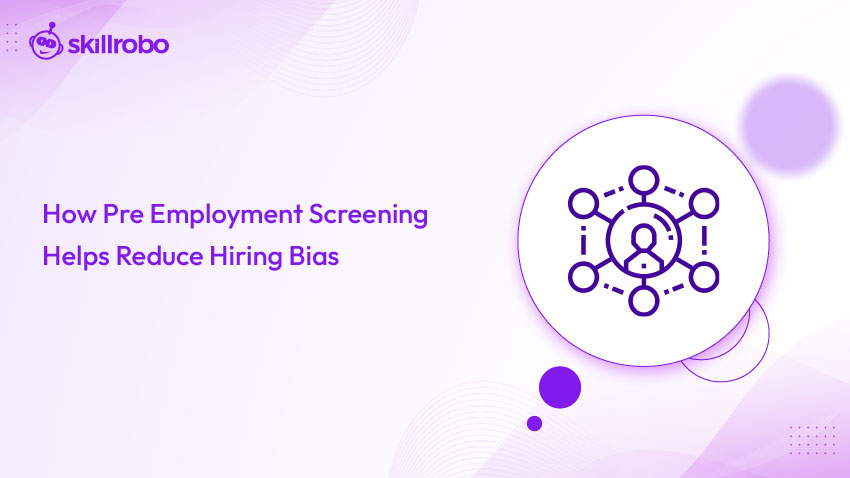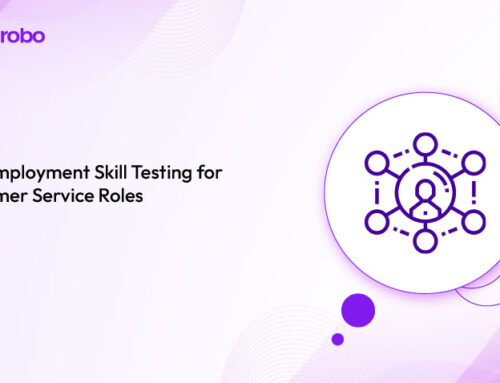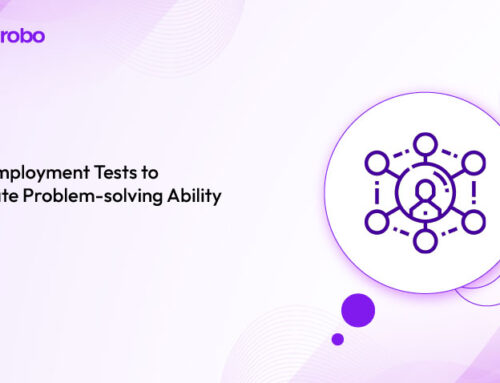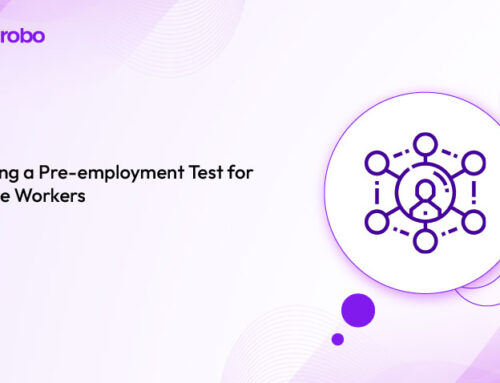
Key Takeaways
- Pre-employment assessments enhance hiring precision by testing skills and fit, moving beyond resumes to identify true candidate potential.
- Customizable platforms like Skillrobo tailor evaluations to specific roles, ensuring alignment with job demands and organizational objectives.
- AI-driven analytics and proctoring deliver real-time insights and test integrity, supporting fair, data-backed hiring decisions.
- Effective tools reduce hiring time, improve employee performance, and cut turnover costs, offering measurable ROI for businesses.
- Selecting the right platform involves defining goals, ensuring scalability, and balancing cost with long-term value for optimal recruitment outcomes.
The Power of Pre-Employment Assessments in Modern Hiring
Hiring the right candidate is a high-stakes decision for any organization. Traditional hiring methods, such as sifting through resumes or conducting unstructured interviews, often fail to reveal a candidate’s true potential or fit for a role. Pre-employment assessment tools address this gap by offering a structured, data-driven approach to evaluate skills, behaviors, and aptitudes. According to a 2023 report by the Society for Human Resource Management (SHRM), 68% of employers now incorporate these tools to refine their recruitment processes.
In this blog, we’ll explore the top pre-employment assessment platforms, their key features, and how they empower HR professionals to make smarter hiring choices.
Why Pre-Employment Assessments Are Essential
Pre-employment assessments provide a reliable, structured method to measure candidate capabilities beyond the surface-level details of a resume or interview. They deliver objective insights into skills, behaviors, and potential, helping organizations hire with greater confidence and precision while addressing common recruitment challenges.
Beyond the Resume
Resumes highlight experience but often obscure practical skills critical to job success. Assessments test real-world abilities, such as problem-solving, technical expertise, or communication, ensuring a stronger role fit. For example, a candidate might claim “Excel proficiency,” but a targeted test can verify their ability to handle complex formulas or data analysis, revealing their true competency.
Reducing Hiring Bias
Subjective judgments in interviews can skew decisions and lead to inconsistent hires. Structured assessments prioritize objective data, minimizing unconscious bias and promoting fairness. A 2022 Harvard Business Review study found that standardized testing reduced hiring bias by up to 25%, making it easier to focus on qualifications over impressions.
Predicting Job Performance
Assessments go beyond static credentials by evaluating how candidates might perform on the job. Tools with predictive analytics can correlate test results with key performance indicators, offering a glimpse into future success. This is especially valuable for roles requiring adaptability or critical thinking.
Enhancing Team Compatibility
Hiring isn’t just about skills—it’s about fit. Assessments can measure behavioral traits and cultural alignment, ensuring new hires complement existing teams. For instance, a leadership role might require resilience, which a tailored test can identify more effectively than an interview alone.
Tip: Pair assessments with clear job descriptions and involve team leads to align candidate evaluations with role expectations and organizational needs.
Key Features of Top Assessment Platforms
The best pre-employment tools combine flexibility, cutting-edge technology, and actionable insights to support effective hiring decisions, enabling HR teams to optimize their recruitment processes with precision.
Customizable Assessments
Top platforms allow HR teams to tailor tests to specific roles, from coding skills for developers to leadership traits for managers. This ensures evaluations reflect the job’s unique demands, improving hiring relevance. For example, a customer service test might focus on empathy and conflict resolution, directly tied to daily responsibilities.
AI-Powered Analytics
Advanced tools leverage AI to analyze results and generate detailed reports. Real-time data highlights top performers, flags areas for improvement, and provides comparative insights, streamlining candidate selection. This feature helps recruiters quickly identify standout talent without manual review.
Proctoring and Integrity
With remote hiring increasingly common, platforms with AI-driven proctoring ensure test security. Features like screen monitoring, webcam oversight, and behavior tracking maintain fairness and credibility, all while preserving a smooth candidate experience for virtual assessments.
Seamless Integration
Leading platforms integrate with applicant tracking systems (ATS) and HR software, centralizing data and reducing administrative workload. This connectivity ensures a cohesive workflow, allowing teams to manage candidates and results from a single hub efficiently.
Tip: Look for tools that integrate with your ATS to centralize data, simplify workflows, and enhance collaboration across hiring teams.
Leading Pre-Employment Assessment Platforms
Several platforms excel in delivering robust, customizable solutions tailored to modern hiring needs. Below are standout options for HR teams, with Skillrobo prioritized first, offering versatile tools to enhance recruitment efficiency and accuracy.
Skillrobo
Skillrobo stands out with AI-based assessments for cognitive, behavioral, and technical skills. It’s Seyarc AI proctoring ensures test integrity, while real-time analytics provide actionable insights for fair, data-driven hiring. This platform adapts seamlessly to organizations of all sizes, supporting diverse roles and industries.
Criteria Corp
Criteria Corp delivers a comprehensive suite of tests, including cognitive and personality assessments. Its HireSelect platform is trusted by firms like Deloitte for its reliability, detailed reporting, and ability to predict candidate success across various roles.
Harver
Harver specializes in high-volume hiring with customizable, role-specific tests. Its behavioral insights enable companies like McDonald’s to pinpoint candidates who align with their culture and operational demands, streamlining large-scale recruitment.
HackerRank
HackerRank focuses on technical hiring, offering coding challenges and skill-based assessments. Widely used by tech firms like Goldman Sachs, it provides a robust library of programming tests to evaluate developer expertise effectively.
Vervoe
Vervoe emphasizes skills-based hiring with job simulations and customizable tests. Its AI-driven grading helps businesses like Amazon assess practical abilities, ensuring candidates can perform real-world tasks relevant to the role.
Benefits of Pre-Employment Assessments
These tools deliver measurable advantages, transforming how companies approach recruitment by enhancing efficiency, improving hire quality, and reducing long-term costs.
Improved Hiring Efficiency
Assessments filter out unqualified candidates early, saving valuable time in the hiring process. A 2023 Deloitte study found that automated screening cuts hiring time by 15 hours per role, a significant advantage for busy HR teams managing multiple openings or tight deadlines.
Better Quality of Hire
By focusing on skills and cultural fit, assessments increase the likelihood of successful hires who thrive in their roles. A retailer reported a 20% rise in employee performance after adopting Skillrobo’s tools, demonstrating the impact of precise evaluations.
Cost Savings
Bad hires are costly, with the U.S. Department of Labor estimating expenses up to 30% of an employee’s first-year salary. Assessments reduce turnover by identifying the right talent upfront, protecting budgets and resources.
Enhanced Employee Retention
Assessments align hires with job demands and company values, boosting satisfaction and longevity. Companies using data-driven tools report lower churn rates, as employees feel better equipped for success.
How to Select the Right Assessment Tool
Choosing a platform requires aligning its capabilities with your organization’s specific needs, resources, and strategic goals to ensure optimal hiring outcomes.
Define Your Objectives
Are you hiring for technical expertise, like software development, or cultural fit for team dynamics? Skillrobo, for instance, offers tailored tests such as coding aptitude assessments to meet precise goals, allowing recruiters to focus on what matters most for each role.
Evaluate Scalability
Growing businesses need tools that manage high volumes without sacrificing quality. Platforms supporting mass hiring ensure consistency across large candidate pools, making them ideal for seasonal hiring or rapid expansion phases.
Balance Cost and ROI
Free tools may lack advanced features like analytics, while premium options like Skillrobo provide lasting value. A 2024 Inc. report noted a mid-sized firm saving $50,000 annually by reducing bad hires through effective assessments.
Assess Technical Support
Reliable customer support and regular updates are crucial for seamless use. Choose platforms offering robust assistance to troubleshoot issues and adapt to evolving hiring needs.
Best Practices for Implementation
Maximizing the value of assessment tools requires thoughtful integration into your hiring process to ensure efficiency and long-term success.
Train Your Team
Ensure HR staff understand how to use the platform and interpret results accurately. A brief onboarding session—covering setup, scoring, and analysis—can boost adoption, confidence, and effectiveness among team members.
Communicate with Candidates
Explain the assessment process upfront to set clear expectations. Transparency about purpose and format builds trust, reduces anxiety, and maintains a positive candidate experience, enhancing your employer brand.
Review and Refine
Regularly analyze assessment outcomes to improve test design and relevance. Adjust questions based on performance trends or role changes to keep evaluations aligned with current business needs and industry standards.
Monitor Compliance
Ensure assessments meet legal and ethical guidelines, such as EEOC standards in the U.S. Regular audits prevent bias and maintain fairness, protecting your organization from potential risks.
Reference: Get started with Skillrobo’s pre-employment testing guide.
Conclusion
Pre-employment assessment tools are game-changers for HR professionals, providing a smarter, more reliable approach to identifying and hiring top talent. Platforms like Skillrobo, with its AI-driven questions, secure Seyarc AI proctoring, and real-time reporting, showcase how technology can elevate recruitment to new heights. By reducing bias, boosting efficiency, and ensuring hires excel in their roles, these tools deliver lasting value, saving time, cutting costs, and strengthening teams. In a competitive talent market, leveraging such solutions is essential for staying ahead.
Ready to transform your hiring process? Sign up for Skillrobo today and unlock the power of data-driven recruitment.
FAQs
1. What skills can pre-employment assessments evaluate?
They assess technical abilities, cognitive skills, and behavioral traits, tailored to roles like sales, IT, or management.
2. How does Skillrobo ensure test fairness?
Skillrobo uses AI proctoring and data-driven metrics to focus on skills, reducing bias.
3. Are these tools suitable for small businesses?
Yes, scalable platforms like Skillrobo adapt to any size, offering cost-effective solutions for smaller teams.
4. How do assessments improve candidate experience?
Structured tests provide a clear, professional process, showing candidates that their skills are valued over subjective factors.
5. Can assessments predict long-term success?
Advanced analytics correlate test performance with job outcomes, offering insights into future potential.









